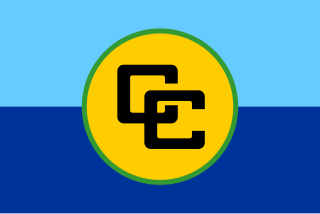
The Caribbean Community is an intergovernmental organisation that is a political and economic union of 15 member states throughout the Americas and Atlantic Ocean. They have primary objectives to promote economic integration and cooperation among its members, ensure that the benefits of integration are equitably shared, and coordinate foreign policy. The organisation was established in 1973, with its four founding members signing the Treaty of Chaguaramas. Its primary activities involve:

The International Union for Conservation of Nature (IUCN) is an international organization working in the field of nature conservation and sustainable use of natural resources. It is involved in data gathering and analysis, research, field projects, advocacy, and education. IUCN's mission is to "influence, encourage and assist societies throughout the world to conserve nature and to ensure that any use of natural resources is equitable and ecologically sustainable".
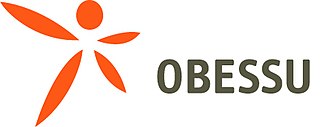
The Organising Bureau of European School Student Unions (OBESSU) is the umbrella organization of 32 national school student unions from 24 European countries. An interlocutor with the European Commission, European Parliament, Council of Europe and UNESCO, OBESSU is a full member of the Lifelong Learning Platform (LLLP) and the European Youth Forum (YFJ), and an associate member of the European Students' Union.

The Organization of the Black Sea Economic Cooperation (BSEC) is a regional international organization focusing on multilateral political and economic initiatives aimed at fostering cooperation, peace, stability and prosperity in the Black Sea region. It traces its origin to 25 June 1992, when Turkish President Turgut Özal and leaders of ten other countries gathered in Istanbul and signed the Summit Declaration and the "Bosphorus Statement". BSEC Headquarters – the Permanent International Secretariat of the Organization of the Black Sea Economic Cooperation – was established in March 1994, also in Istanbul.
The United Nations General Assembly has granted observer status to international organizations, entities, and non-member states, to enable them to participate in the work of the United Nations General Assembly, though with limitations. The General Assembly determines the privileges it will grant to each observer, beyond those laid down in a 1986 Conference on treaties between states and international organizations. Exceptionally, the European Union (EU) was in 2011 granted the right to speak in debates, to submit proposals and amendments, the right of reply, to raise points of order and to circulate documents, etc. As of May 2011, the EU is the only international organization to hold these enhanced rights, which has been likened to the rights of full membership, short of the right to vote.
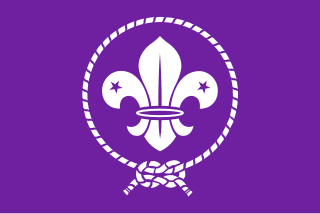
The European Scout Region is one of six geographical subdivisions of the World Organization of the Scout Movement, headquartered in Geneva, Switzerland, with a satellite office in Brussels, Belgium.
The International Cooperative Alliance (ICA) is a non-governmental cooperative organization founded in 1895 to unite, represent and serve cooperatives worldwide. The ICA is the custodian of the internationally recognised definition, values and principles of a cooperative in the ICA Statement on the Cooperative Identity. The ICA represents 315 co-operative federation and organisations in 107 countries.
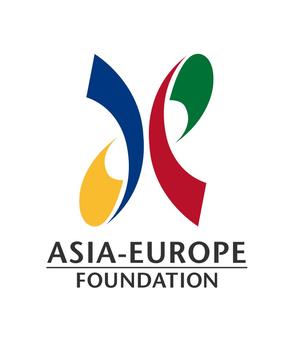
The Asia–Europe Foundation (ASEF) is an intergovernmental not-for-profit organization located in Singapore. Founded in 1997, it is the only institution of the Asia-Europe Meeting (ASEM). Its purpose is to promote mutual understanding and cooperation between the people of Asia and Europe through intellectual, cultural, and people-to-people exchanges.
Scholars at Risk (SAR) is a U.S.-based international network of academic institutions organized to support and defend the principles of academic freedom and to defend the human rights of scholars around the world. Network membership includes over 530 higher education institutions in 42 countries.
The European Society for Engineering Education an organisation for engineering education in Europe. Commonly known as SEFI, an acronym for its French name, Société Européenne pour la Formation des Ingénieurs, it is also known in German as the Europäische Gesellschaft für Ingenieur-Ausbildung. SEFI was founded in Brussels in 1973 and has more than 300 members in 40 countries. It promotes information exchange about current developments in the field of engineering education, between teachers, researchers and students in the various European countries.
Since being founded in 1975, the European Nuclear Society (ENS) has grown to become the largest society in Europe for science, engineering and research in support of the nuclear industry. ENS's membership consists of national nuclear societies from 22 European countries, and additionally, Israel. Within the membership there are also stakeholder representatives for nuclear technology and research businesses, with around 60 corporate members. ENS exists to promote the advancement of peaceful uses of nuclear energy on an international level, encouraging networking between countries and facilitating meetings to support global communication on scientific and technical affairs. ENS also supports education and training in engineering, promotes international standardisation in the nuclear industry, coordinates the activities of the member organisations and develops the expertise and capability needed for the future of the industry. One of ENS's activities is organising conferences and workshops, providing a platform for international forums to exchange knowledge, experience, ideas and scientific developments.

The International Forestry Students’ Association (IFSA) is an international network of students in forestry-related sciences. It is a globally organized and locally operated student organisation connecting forest and related science students to peers, forest-related organisations, and policy platforms. The IFSA has 130 member associations in over 50 countries. IFSA is a non-political, non-profit, and non-religious organisation that is entirely run by students.

The Union for the Mediterranean is an intergovernmental organization of 43 member states from Europe and the Mediterranean Basin: the 27 EU member states and 16 Mediterranean partner countries from North Africa, Western Asia and Southern Europe. It was founded on 13 July 2008 at the Paris Summit for the Mediterranean, with an aim of reinforcing the Euro-Mediterranean Partnership (Euromed) that was set up in 1995 as the Barcelona Process. Its general secretariat is located in Barcelona, Catalonia, Spain.
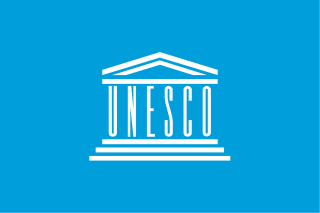
The United Nations Educational, Scientific and Cultural Organization (UNESCO) is a specialized agency of the United Nations (UN) aimed at promoting world peace and security through international cooperation in education, arts, sciences and culture. It has 194 member states and 12 associate members, as well as partners in the non-governmental, intergovernmental and private sector. Headquartered in Paris, France, UNESCO has 53 regional field offices and 199 national commissions that facilitate its global mandate.

The European Centre for Nature Conservation (ECNC) was a Dutch non-profit foundation which was active in the field of European nature and biodiversity policy between 1993 and 2017. It was set up as a network of university departments, expert centres and government agencies and operated as a European biodiversity expertise centre. The organization promoted sustainable management of natural resources and biodiversity, and aimed to stimulate interaction between science, society and policy.

European University Sports Association (EUSA) is an umbrella non-governmental (NGO) non-profit organisation, working in the field of university sport in Europe.
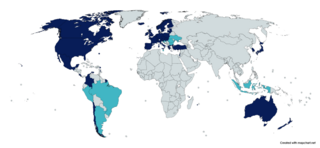
The Organisation for Economic Co-operation and Development is an intergovernmental organisation with 38 member countries, founded in 1961 to stimulate economic progress and world trade. It is a forum whose member countries describe themselves as committed to democracy and the market economy, providing a platform to compare policy experiences, seek answers to common problems, identify good practices, and coordinate domestic and international policies of its members.
The European Marine Board is a pan-European network of national organizations involved in marine research which are either research funding organizations, research performing organizations, or nationally based consortia of third-level institutes. The European Marine Board (EMB) is the leading European think tank in marine science policy. The Board provides a platform for its member organizations to develop common priorities, to advance marine research, and to bridge the gap between science and policy to meet future marine science challenges and opportunities. Established in 1995, it is a partnership facilitating enhanced cooperation between European organizations involved in marine science towards development of a common vision on the research priorities and strategies for marine science in Europe. It also facilitates enhanced cooperation between stakeholders involved in supporting, delivering and using marine research and technology.
The Czech Science Foundation (GACR) was established in 1993 as an independent public organisation supporting basic research in the Czech Republic. On the basis of calls for proposals and a public competition, the Czech Science Foundation provides financial support for both experienced and young and early-stage researchers. It also funds international projects on a bilateral basis in cooperation with several partner agencies as well as projects carried out within international research programmes. It is one of two major government-supported research funding agencies in the Czech Republic, the other being the Technology Agency of the Czech Republic (TAČR).

The European Partnership for Democracy (EPD) is a membership-based network of not-for-profit organisations that describes its aim as "supporting democracy around the world".












